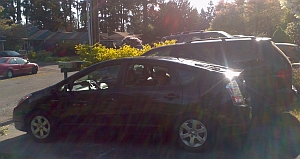Last week, I wrote about my quest to buy a new car. We’re sick of our minivan/land yacht and want something smaller and more fuel-efficient that will nonetheless fit our whole family (and our dog) for our daily city commute.
I received all sorts of helpful advice/tips/info in the comments on that post. It made me appreciate anew the great community we have here at Grist.
After so many years of doing this, I’ve even come to appreciate the more … enthusiastic feedback. I learned that I should get a new wife because mine complains too much, that I should get rid of my dog, or leave the dog at home, that I should stop being a cosseted hypocrite and start getting my kids to school and doing my errands by bus or bike, and that above all, I should never, ever say anything nice about cars generally or any car specifically and that by doing so I have disgraced myself, disgraced Grist, and most likely disgraced the baby Jesus.
Thing is, the way I was shopping for a car — seeking a balance of features, comfort, and fuel efficiency — is what I take to be the “normal” way Americans shop for cars. Many Americans care about fuel-efficiency, and some about sustainability, but very few care enough for those qualities to trump all other considerations. And fewer still are willing to rearrange their daily lives around the inconveniences of sub-par public transit systems in order to avoid the sin of car ownership.
The dolorous monks among the commenters reflect, I fear, what the great mass of non-environmentalists expect from environmentalists: scorn, condescension, and above all, judgment. When I tell civilians that I write for an “environmental website,” they immediately take on a guilty mien and start shifting from foot to foot, stammering about how they try to recycle, as though they’re trying to apologize for or justify their daily habits. They expect me, as an environmentalist, to be a kind of monk, full of virtue and contemptuous of their lack.
It is not a role I want any part of. And it is not to environmentalism’s benefit that people think of it that way, as a kind of ascetic order standing outside U.S. consumer culture, condemning those within as weak and fallen.

David’s new Prius, bathed in Seattle’s uncharacteristic May sunshine.
Anyway, thanks to the many people who weighed in with constructive insights, on- and off-line. I know that tens and tens of you are following this quest with bated breath, so I shall herewith report the results. I’m afraid it’s not very exciting. In fact, we made what is, for people in our circumstance, the most boring, predictable choice conceivable. We’re basically a Portlandia skit.
We bought a used Prius.
In the end, we couldn’t justify the ecological impact or financial cost of buying a new car. There is, I admit (even if the green righteous will not), a powerful attraction to buying a new car. It’s a big, shiny new toy! It’s got all the new tech widgets. Everything works just so. And that smell …

David’s kids like the new car.
But ecologically speaking, a huge chunk of a car’s impact comes in manufacturing. And economically speaking, it loses a huge chunk of its value the minute it drives off the lot. There’s just no way to justify buying a new car. I say that as someone who wanted, and kind of still wants, to do it.
The question then became: Where can we find high in-city gas mileage in a used vehicle? And on that metric, nothing compares with a Prius. Not even close. There are some small cars that can get up to the mid- to high-30s on the highway. A VW Jetta TDI wagon, for instance, gets great highway mileage. But for city driving — which is 95 percent of what we do — nothing beats a hybrid. The very best gasoline or diesel alternatives are a good 10 mpg lower in the city. There are Honda Insights around, but they’re too small. We don’t want an SUV, so the Escape is out. There are lots of new hybrid hatchbacks, but very few used ones. So …

Forest fits in the new car.
I borrowed a friend’s Prius and drove around for a while with my dog in the back. And while the hatch area is not as spacious as it would be in a Prius v (sigh), it’s plenty big. The dog will be fine.
So there it is: We’re getting a black 2009 Prius with about 35,000 miles on it for around $20K ($2K or so under blue book). We view this as the medium-chill choice: good-enough. My wife didn’t get the tan interior she wanted, but she got leather seats (easier to clean!). I didn’t get the cargo room I wanted, but I got enough. And we’re getting up to 50 mpg in the city, which is pretty damn sweet.
Anyway, thus is my car saga, come to a close. Thanks for following along!



